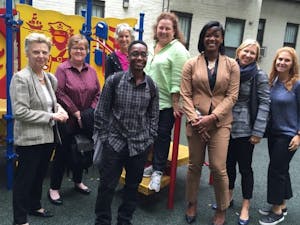

CLC Week 3 Explores Homelessness and Housing
Insights
September 30, 2016


A common challenge for New Yorkers is the soaring cost of rent. While housing costs can be an obstacle for many of the Big Apple’s residents, low-income New Yorkers are hit particularly hard.
According to CCC’s online database Keeping Track, in 2014 more than half (56%) of New Yorkers were rent-burdened, meaning their rent exceeded 30% of their income. And as of July of this year, nearly 23,000 children lived in homeless shelters.
Our CLC participants visited several organizations throughout the city that are working to support those children and families and help them find stable housing, access critical resources, and develop the life skills they need to transition to independent living.
Housing Court Answers in the Bronx advances homeless prevention work. The nonprofit coalition helps empower tenants who cannot afford legal representation in Housing Court. These services are key in New York City, as a recent New York Times article pointed out that more than 70% of low-income tenants in the city do not have legal representation in Housing Court. Housing Court Answers works to change that by helping people manage administrative paperwork and access comprehensive legal services.
St. John’s Family Place Shelter in Crown Heights offers comprehensive supports to the families it serves. In addition to providing temporary housing for nearly 100 families, St. John’s Place offers childcare, after-school programs, and training and employment programs that allow families to work toward self-sufficiency.
Other programs in the city are designed to help homeless and runaway youth, who experience high rates of violence, sexual assault, illness, and behavior disorders and often need support beyond a bed to sleep in at night. CLC participants visited two such programs, called Transitional Independent Living facilities, that provide not only shelter but also skill development such as budgeting, grocery shopping, cooking, cleaning, and more, to prepare them for thriving independent adulthoods.
Covenant House in Midtown West serves as a crisis shelter as well as a Transitional Independent Living program. Covenant House is open all day, every day and provides an array of crucial resources, including safe housing, food, clothing, case management, and medical care to homeless and runaway youth. Covenant House aims to reunify the youth it serves with their families, and in cases where that’s not possible, it puts them on a supported path to independent living.
The Chelsea Foyer in Chelsea is also a Transitional Independent Living Program and serves young adults between the ages of 18 and 25 who have aged out of foster care or were homelessness or at risk of homelessness. Chelsea Foyer offers personalized services for up to two years that help prepare young adults for independent lives and careers.
We as a city have much more work to do to ensure that all children can exercise their right to grow up in an affordable home. CCC advocates for policies and programs that do just that, including anti-eviction legal services, increasing the number of beds in the youth shelter system for runaway and homeless youth, Renter Tax Credits and an increase in Section 8 Housing Vouchers, and more.
If you missed last week’s post on the CLC’s visits to organizations fighting food and income insecurity, be sure to check it out. And visit the blog again next week for a look at the CLC’s week studying child health and mental health!



